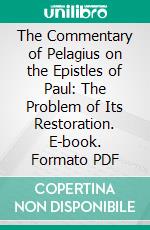The Commentary of Pelagius on the Epistles of Paul: The Problem of Its Restoration. E-book. Formato PDF - 9780259676737
Un ebook di Souter Alexander edito da Forgotten Books, 2017
- € 5.85
Now one of the sons of the British Church was to write what appears to be the oldest surviving book by a native of this country, and was to give utterance in it to some words by which the Christian thought of all succeeding ages has been affected.
It has been debated whether Pelagius was a citizen of the Roman Empire, belonging to the province of Britain, or an Irishman. The ancient evidence is conflicting. Sometimes he is spoken of as Britto, sometimes as Scottus. The former epithet seems more likely to be correct, if we take all the circumstances into account. It is more often given to him than the title Scottus, which may have been applied to him by the contempt and hatred of his enemies, as the Irish were amongst the destroyers of Roman civilization in Britain. The character of his works shows also that he had received an excellent education, and this it would have been easier for a Briton to obtain than for an Irishman. But Professor Bury's solution of the difficulty may be the right one. He supposes that Pelagius was descended from Irish settlers in Somerset, or Devonshire, or Cornwall, or the southwest coast of Wales. There is evidence for the existence of such settlers there, and if Pelagius did indeed belong to that stock, we have an excellent explanation of the double tradition. It was the practice of the Romans to apply the ethnic name to the inhabitants of their provinces, irrespective of race; the term Brittones would thus cover Irish people resident in Britain.
But whether Briton or Irishman, he appears to have found his way to Rome in the closing years of the fourth century. We may suppose that he was animated by a thirst for learning, was possessed of considerable private means, and was naturally drawn to the centre of things. In Rome he lived the life of a monk and a student. He occupied himself mainly with the study of the Bible, of which favourite portions appear to have been The Book of Wisdom and the Epistle of James. But Paul's Epistles attracted him most of all, and he projected and completed a commentary on these epistles. He chose the Vulgate text of Jerome, which had been issued in 383 and 384, as the basis of his comments, and published the text and commentary at Rome, the great book-mart of the world, somewhat before the year 410.
From Rome the commentary circulated over the Western world, and was quoted not long after publication by two contemporaries, Augustine and Marius Mercator.
Informazioni bibliografiche
- Titolo: The Commentary of Pelagius on the Epistles of Paul: The Problem of Its Restoration. E-book. Formato PDF
- Autore: Souter Alexander
- Editore: Forgotten Books
- Data di Pubblicazione: 24 Ottobre '17
- Formato: PDF
- Protezione: nessuna
- ISBN-13: 9780259676737

A Pocket Lexicon to the Greek New Testament. E-book. Formato PDF
Alexander Souter
edizioni Forgotten Books

Hints on Translation From Latin Into English. E-book. Formato PDF
Alexander Souter
edizioni Forgotten Books

The Commentary of Pelagius on the Epistles of Paul: The Problem of Its Restoration. E-book. Formato PDF
Alexander Souter
edizioni Forgotten Books



